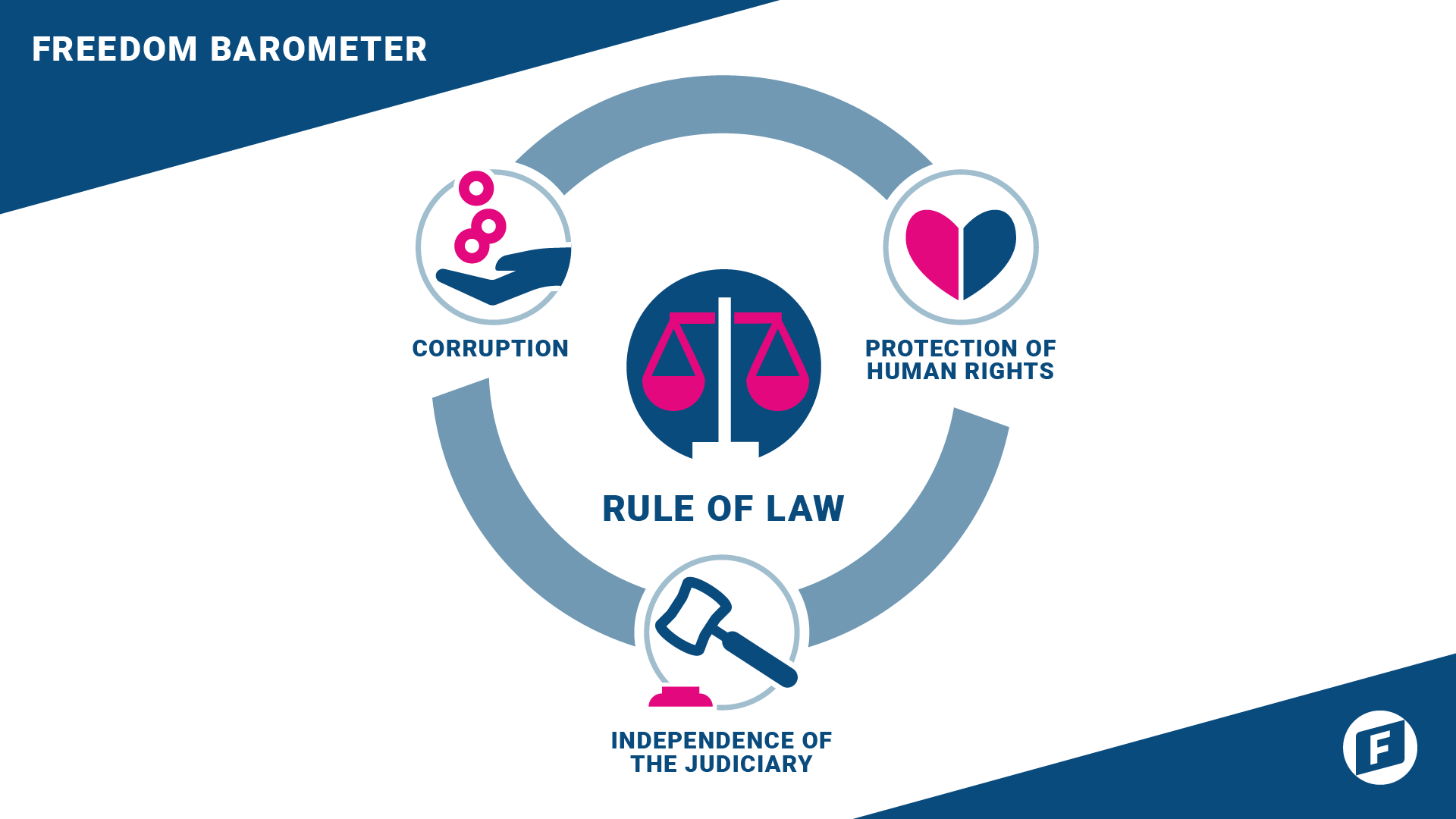Freedom Trends
Rule of Law Freedom: 10 Years Freedom Barometer

Rule of Law Freedom
©The rule of law is a cornerstone of the European way of life. It is mentioned as one of the most important among the ‘Copenhagen criteria’ for EU membership. Compliance with the rule of law is also among the key prerequisites for membership in the Council of Europe, which puts it, together with individual freedom and political liberty, as a basis of the system of democracy
RULE OF LAW IS A CORNERSTONE OF THE EUROPEAN WAY OF LIFE.
In the Freedom Barometer project, which evaluates and compares human freedom in various countries of Europe and Central Asia, the rule of law is basically understood as equality under just laws and is, along with political freedom and economic freedom, one of the three categories through which freedom is measured. Among many, three aspects of the rule of law are thereby considered as crucial and indicative: independence of the judiciary, an absence of corruption, and respect for human rights.
Throughout the decade 2010-2019, Freedom Barometer has collected and processed data from various sources on developments related to freedom, including the rule of law, in 45 countries of Europe, Eurasia, and Central Asia. However those processes have been – except in rare times of revolutionary events of a significance for the entire continent such as in 1989 and immediately afterwards – of a slow nature, and, however the situation in different countries might vary, some general characteristics could be drawn out and trends noticed.
The most important conclusion is that the rule of law, at least on average, has advanced further in transition and post-transition countries, those that had experienced totalitarian or authoritarian regimes in the recent past, and where pluralist democracy, the rule of law, and ideas of individual freedom have still been growing deeper roots. The trend is especially visible in the Caucasus (with Georgia as a true champion and Armenia trying to keep pace with it), in the Baltics (where Lithuania and Latvia are making strong efforts to follow the already successful rise of Estonia from the dust of pure political voluntarism in times of “real socialism” to the stars of being a liberal role model for much of the European continent) and in South Eastern Europe (with Slovenia and Albania showing the biggest improvements).
ESTONIA ROSE FROM THE DUST OF PURE POLITICAL VOLUNTARISM TO THE STARS OF BEING A LIBERAL ROLE MODEL.
Recent newcomers to the EU (Bulgaria, Romania and Croatia) showed improvement in general, yet not a steady and linear one, but a mixed situation wherein old, pre-EU habits in some fields proved stubborn or prone to relapse. But, despite of the hesitation of the political elites in those countries to embrace the principles of the rule of law wholeheartedly, without tongues in their cheeks, positive developments included an increased self-confidence in civil society. Especially when it came to fighting corruption, but also when certain human rights were endangered, citizens often proved more conscious and dedicated than politicians and put public pressure of a magnitude, organisation and sophistication impossible prior to these countries’ accession to the EU.
A FEW NEW EU MEMBERS OR TRUSTWORTHY CANDIDATES FACED POPULIST TAKEOVER AND A SUBSEQUENT DETERIORATION IN POLITICAL FREEDOMS AND THE RULE OF LAW.
There is a dark side too, wherein countries that had initially joined the EU (such as Hungary and Poland) or had been trustworthy candidates (such as Turkey) faced populist takeover at elections and a subsequent deterioration of either political freedoms or the rule of law (or quite often both, hand in hand). In Eastern Europe and Central Asia (except partially in Moldova and Kyrgyzstan), the earlier very low level of respect for the rule of law either improved little, far below the level urgently needed, or even deteriorated further.

Changes in the Rule of Law Score by Country
For their part, a majority of the most advanced European democracies (EU-15) faced either a stagnation or a small fall in the (previously very high levels of) respect for the rule of law. It could be considered, with a grain of salt, as a sort of “harmonisation” within the EU as well as among the OSCE countries – many new democracies have improved in numerous aspects of the rule of law, while in some of the most developed “old democracies” (e.g., Austria, the Netherlands, the Nordic countries, or Switzerland) there was a minor decline in the rule of law. That means that the worse ones have learned quite a lot from the best ones, but also that the best ones have “learnt” something from those who had neglected rule of law in the past, especially in the field of corruption.
-
Download the full report!